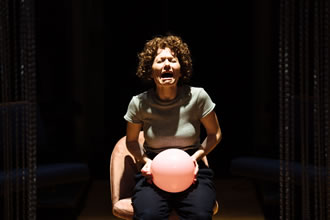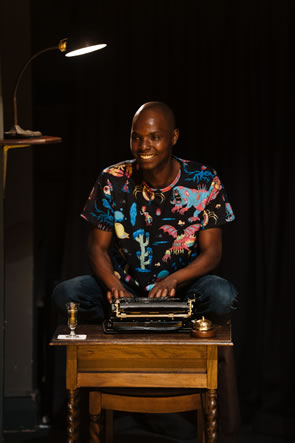The Play 'Gives Insight Into A Tragic And In Some Cases Shameful Era In Dutch History'
Liz Vercoe reviews Amsterdam – at the Orange Tree Theatre, Richmond

Daniel Abelson, Hara Yannas, Michal Horowicz
A story seldom told is given new meaning in the face of current distrust of anyone "not like us", discovers Liz Vercoe
There's a line in this play that "no one wants to hear about the Jews anymore", as a sad reflection on today where antisemitism, whether casual, as in "just a bit of banter", or deeply cruel, is openly expressed without much being done about it by our leaders or authorities.

Michal Horowicz
This play, set in today's Netherlands, does address some of the reasons: Palestine v Israel, nervousness of anyone who comes from a country east of Germany, survivors' guilt, confusing Kosher with Halal and therefore Jews with Muslims (aka Isis), envy of commercial or artistic success, er, and... The reasons get ever more ridiculous and so dangerous.
Were these the sort of reasons that so many people turned a blind eye to the elimination of Jews in the Second World War ponders our unnamed central character? She is a successful violinist, pregnant, renting a gorgeous flat overlooking a famous canal, all of which she hopes will protect her from prejudice at her Jewishness. Her Israeli Jewishness. Her real or imagined fears are triggered by her pregnancy and a society which appears increasingly anti anyone who's not European.
Israeli playwright Maya Arad Yasur, here translated from Hebrew by Eran Edry, has written from the heart of personal experience. And the play is completely open structured. She gives no lines to specific characters but just asks that her words, including the footnotes, are spoken by a minimum of three people. Here we have a cast of four: two men, Daniel Abelson and Fiston Barek, and two women, Michal Horowicz and Hara Yannas. It's a piece of perfectly balanced casting by Sophie Parrott, vital as it's only the change of pace and delivery between the characters that help make sense of the lines being handed one to another. The actors are equally charismatic.

Fiston Barek
The "action" takes place on an initially empty set, with just a yellow floor (as in the yellow of the stars sewn on wartime Jews' clothing) and a bell and a typewriter off stage. From this, director Matthew Xia, who did such a good job with Fugard's Blood Knot at the Orange Tree, conjures the impression of a story being made up in front of your eyes. We watch four people apparently improvising an account of modern Amsterdam where, "one day something odd occurs". And so we are sucked in to a tale of terrible deeds, not knowing what will come next, like children with no defence against our own fears and imagination. When, later in the play, three simple belts and clasps drop from the ceiling they seemed utterly malevolent.
It's a tough, concentrated listen for 80 minutes with little visual respite. Like the best storytellers, each of the cast uses the athleticism of their voice and body to weave the fantasy, but the audience is asked to work hard, too, creating the images and recognising the connections. No time to wonder if the 65 bus will be running on schedule or remembering to add loo rolls to the shopping list!
The reward for your effort is insight into a tragic and in some cases shameful era in Dutch history that you might not otherwise know about and a decent chill down the spine – you could also find yourself a bit less casual about booking that holiday apartment beside the canal...
Liz Vercoe
Images: Helen Murray
September 16, 2019
Related links
|